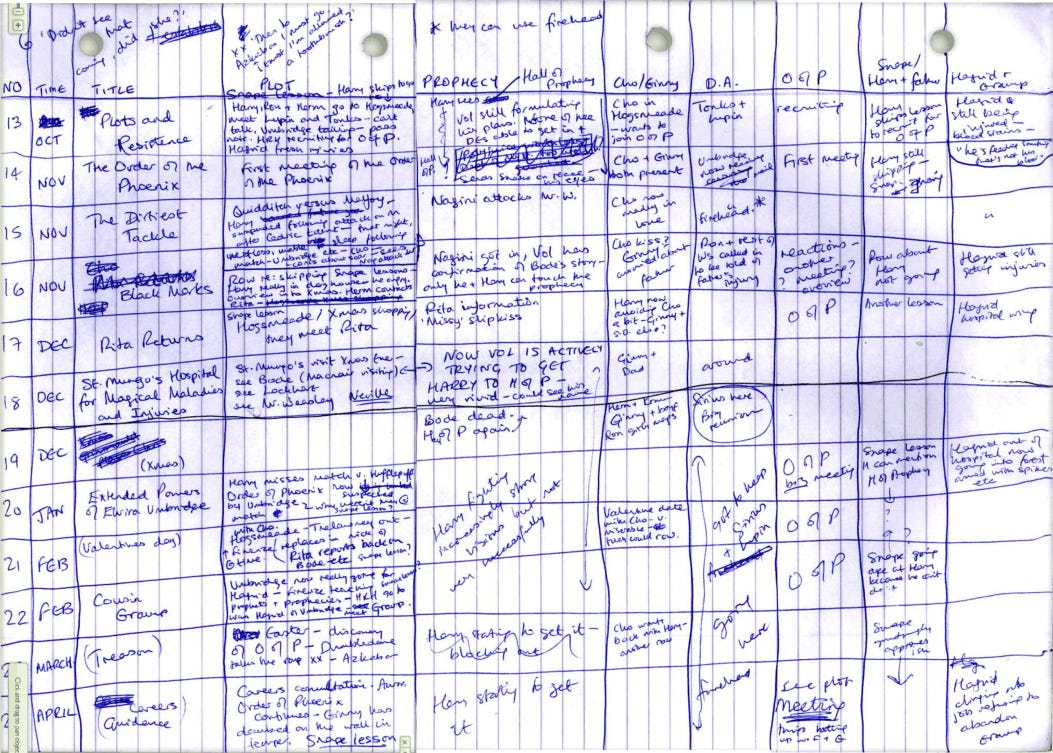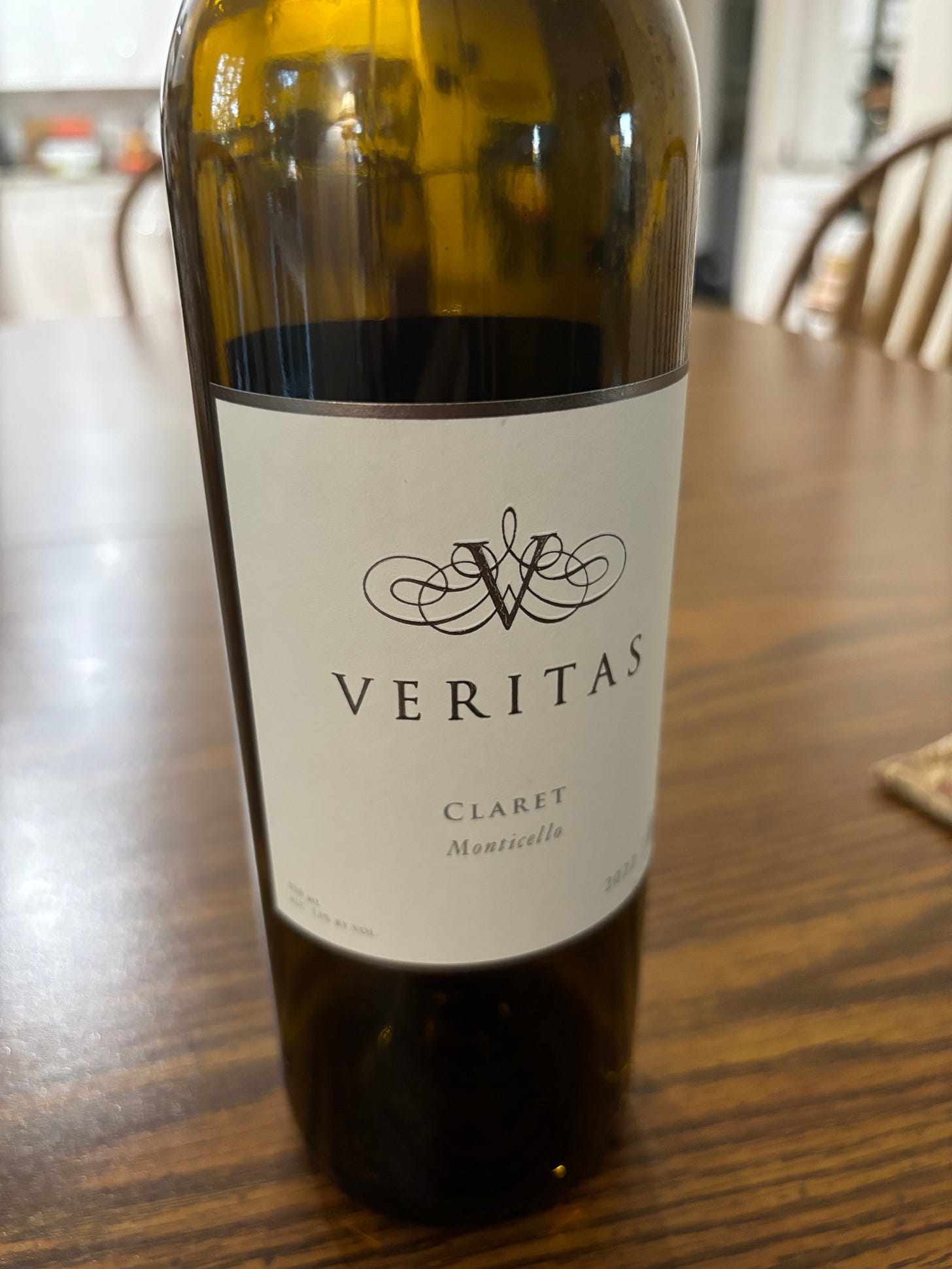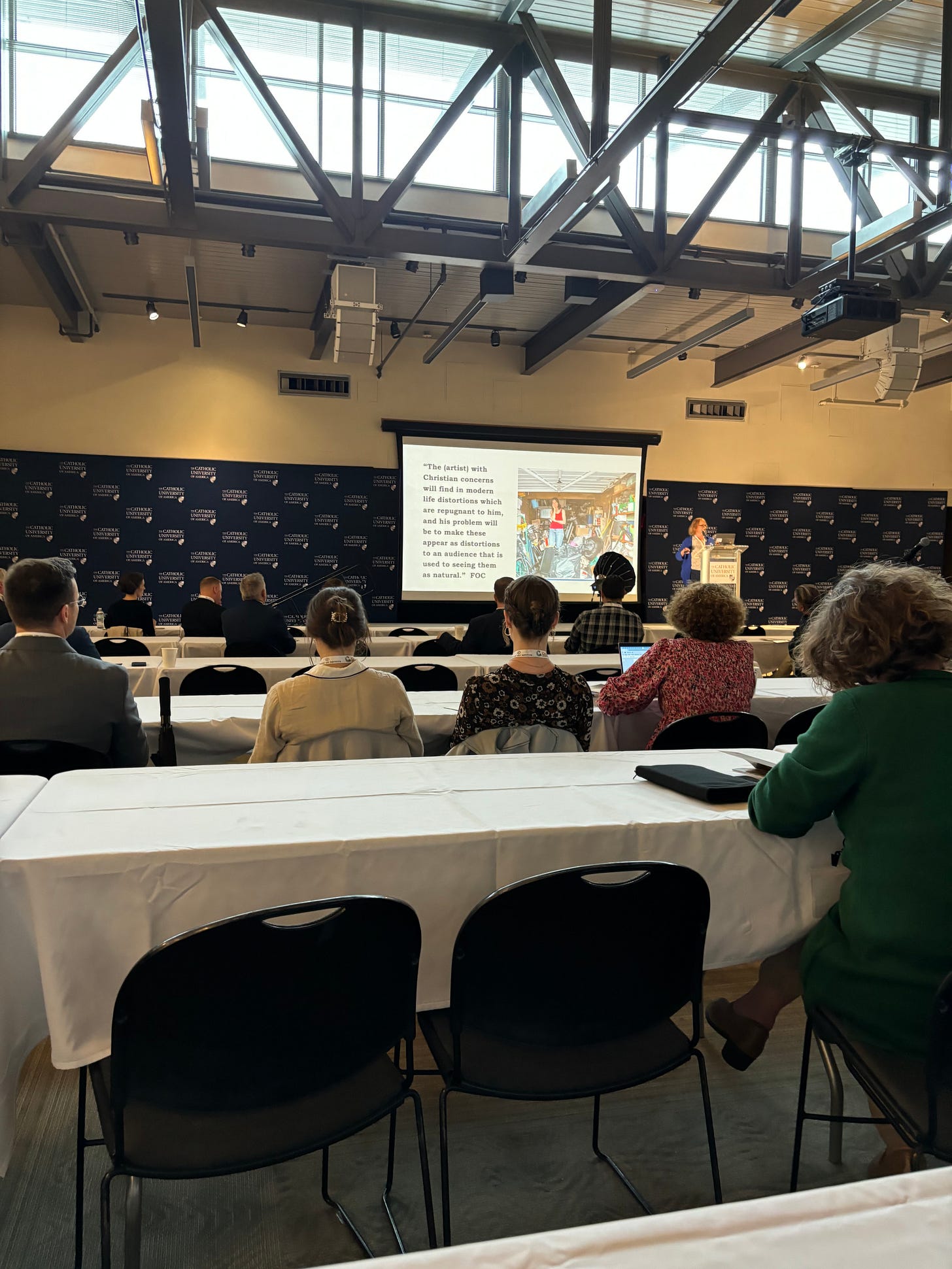THE COMIC MUSE | OCTOBER 2024
In Which I Discuss Planning versus Pantsing, Sharing Your Work, Good Claret, and More!
Welcome to The Comic Muse, the monthly newsletter by novelist, dramatist, and philosopher Daniel McInerny.
Happy October, Friends. I hope this missive finds you well. The photo above is the October view from Old Rag Mountain in Virginia, taken by my daughter Lucy on one of her hikes.
Can We Put an End to the “Planning versus Pantsing” Debate?
The problem is often cast in these terms:
Either you plan everything out before you write, or you write “by the seat of your pants,” one sentence at a time without a plan.
E.L. Doctorow, in his Paris Review interview, seemed to set out a brief manifesto for pantsers: “Writing is like driving at night in the fog. You can only see as far as your headlights, but you can make the whole trip that way.”
Then there’s Stephen King’s caustic remark: “Outlines are the last resource of bad fiction writers who wish to God they were writing masters’ theses.”
Hemingway, Muriel Spark, and Tom Stoppard are other famous writers who speak up for pantsing.
Among those devoted to making a plan before commencing composition, there are also some formidable models: J.K. Rowling, John Grisham, and P.G. Wodehouse.
Part of Rowling’s plan for Harry Potter and the Order of the Phoenix.
But casting the problem as a matter of “planning versus pantsing” presents a false dichotomy. I’m deeply suspicious that any of the so-called pantsers named above failed to think about compositional form (structure, planning), or that any of the so-called planners didn’t depend upon intuition in the moment of composition, and even during the planning itself.
Because I don’t think it’s possible to do just one or the other—that is, if you are trying to write something as large and complex as a novel.
You simply don’t have a work of art without compositional form—and that requires both planning and the “lightning strike” of intuition.
Which means that the thinking required to construct a compositional form is either going on alongside the author’s intuitive work composing sentences and paragraphs, or it happens after the first, very messy draft. Either way, that thinking goes on.
Moreover, I would say that intuition is ignited by planning; and that planning takes better shape via intuition.
Creativity, in other words, is harmonic, not schizophrenic.
What’s important for me is for my left-hemisphere thinking and my right-hemisphere thinking to cooperate with one another—with the right-hemisphere taking the lead, as in a dance.
How does right-hemisphere thinking take the lead? By allowing me to enter my imaginary world and to be present to the characters and their actions as they pursue their goals. This kind of imaginary “presencing” is crucial to both planning and composition.
Think of planning as akin to pre-production on a film: you need to scout locations and hire actors; you need to design the production and you need a road-map (a script) for what you are going to film. Composition is akin to what actually goes on in front of the camera after the director yells “Action!” In composition, the writer is an actor, or rather an entire ensemble of actors, present in the moment, letting intuition lead the way.
Does the planning ever change during composition? Of course it does—when intuition demands it. Does good planning sometimes create better writing than what an author manages to do “in the moment” of composition? Of course it does, because, again, good planning already involves intuition.
For getting the harmonic relation right between left-hemisphere and right-hemisphere modes of thinking when it comes to writing, I am grateful to novelist Amor Towles, author of A Gentleman in Moscow and the more recent collection of stories, Table for Two. His remarks in the following interview are illuminating…
(I clipped the video so that it starts just a few seconds before Towles starts talking about his approach to planning and writing a novel at 7:00.)
Here’s more from me on the subject of intuition…
Should We Share Work in Progress?
Towles also has interesting things to say concerning the wisdom of sharing work in progress. His comments in the following interview with Michael Lewis have convinced me that the kind of approach recommended by Austin Kleon in his book, Show Your Work, is not the best way for writers to go. Kleon advocates taking your audience behind the scenes throughout the process of composition, while Towles advocates mortifying the temptation to share work in progress.
One reason for not sharing, as Towles and Lewis agree, is simply that…your audience doesn’t care! But the main reason they agree upon has to do with the conservation of energy…
Our Lady of the Rosary
Today, October 7, is the Feast of Our Lady of the Rosary, which always puts me in mind of my days teaching high school, when every October 7 I would recite G.K. Chesterton’s poem “Lepanto” for my English classes—there is perhaps no better example of alliteration—as the Battle of Lepanto in 1571 inspired this feast day.
In his obituary for Chesterton, T.S. Eliot praised Chesterton’s poetry as “first-rate journalistic balladry.” You can read Chesterton’s poem for yourself here.
The following recorded reading includes very helpful annotations and images…
Movie of the Month
Recently we rewatched, for the first time in many years, Kenneth Branagh’s 1993 film adaptation of Shakespeare’s Much Ado About Nothing, which my wife Amy and I first saw in its original run in theaters. It is certainly in my Top 20 list of movies of all time, perhaps even in my Top 10. A joyous, witty, sparkling comedy. No film makes Shakespeare more accessible and enjoyable than this one. And Branagh’s Benedick is his greatest comic turn…
Wine of the Month
Veritas Vineyards (Afton, Virginia), Claret, 2022 | Monticello.
On the back label is the following quotation from John Keats’ 1819 letter to his brother George:
“How I like Claret! When I can get Claret, I must drink it. ‘Tis the only palate affair that I am sensual in. If you could make some wine like Claret to drink on summer evenings in an arbor! It fills one’s mouth with a gushing freshness, then goes down cool and feverless: then, you do not feel it quarreling with one’s liver. No, ‘tis rather a peacemaker and lies as quiet as it did in the grape.”
Veritas’s Claret is 40% Petit Verdot, 35% Merlot, 15% Tannat, and 10% Cabernet Franc.
Which means that Claret is no longer red wine exclusively from the Bordeaux region of France.
Here’s a nice look at the beauty of Veritas Vineyards in central Virginia…
Books of the Month
I’m on page 780+ of the 900+-page Nicholas Nickleby by Charles Dickens, and enjoying every delightful minute of it.
And have just started Andrea Wulf’s fascinating Magnificent Rebels, about the rise of Romanticism and the invention of the modern self in the little town of Jena in Germany in the 1790s. If you’re not ready to tackle the whole book, this interview with Wulf on The Rest is History Podcast is an engaging overview of the work.
In preparation for my spring course, “Poetic Experience and Truth,” I am also doing a slow, careful, annotated read of St. John Henry Cardinal Newman’s An Essay in Aid of a Grammar of Assent.
What I’ve Been Up To
Besides work on the work-in-progress I’m not sharing any of the progress about, I’ve been immersed in my teaching at Christendom College (my elective this fall is the Philosophy of Culture), as well as the follow-up to Beauty & Imitation.
I also recently completed an essay on comedy I was asked to write by my friend Rhonda Ortiz, editor at Dappled Things. The essay, entitled “The Very Model of a Modern Catholic Comedy,” will appear in the journal’s Candlemas issue.
And my scholarly essay, “Literature as Tradition-Constituted Inquiry,” which applies Alasdair MacIntyre’s work on traditions to literary traditions, was just accepted by Logos: A Journal of Catholic Thought and Culture. I’m not quite sure yet when it will appear—hopefully sometime in 2025.
And if you missed my talk “Beauty 101,” which I delivered at the Catholic Information Center in Washington, D.C. on September 4, you can access the video here…
“Beauty 101” was co-sponsored by the Catholic Artists Institute, whose wonderful conference I attended on September 17 at The Catholic University of America. Here is screenwriter and CAI board member Barbara Nicolosi sharing her thoughts on beauty and storytelling at the conference…
If you’ve just joined us at The Comic Muse and are new to my work, you can find out more about it here and here.










I think of myself not as a pantser or a plotter, but as a herder. The goal is to get the character into a pen at the other side for the field. Character is why the character does not want to go into the pen and all the particular ways they will attempt to avoid going there. Plot is the dog that cuts them off every time they try to move away from the pen until eventually they have no choice but to enter it. After that it's just shearing and branding.
Plot, then, is a reaction to character in action. There is room for discovery and invention while always pursuing the goal of getting the characters into the pen. Plotting everything out from the beginning precludes learning from character as it develops. Pantsing means letting the dog chase the sheep around the field until they die of exhaustion without any idea of where the pen is.
Wonderful article! I am in the midst of an "Autumn Author Challenge" where the goal is to simply sit and write a short story in one go. You are given three prompts to incorporate into the story and you take a minute to let the unrelated prompts connect themselves in your mind. Then you set a timer for an hour or two and just go!